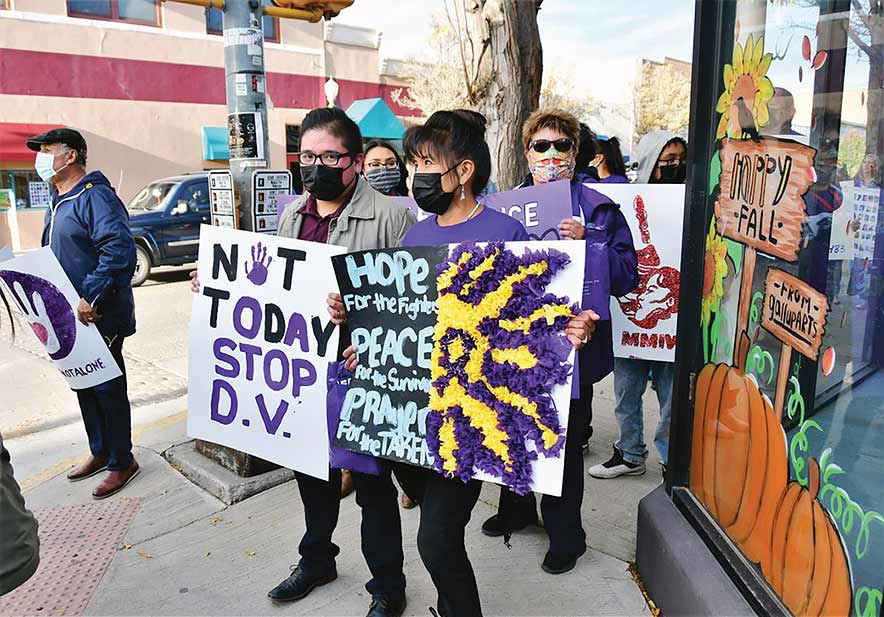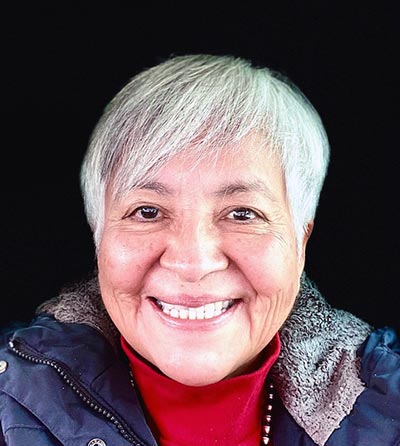
Guest Column: During Domestic Violence Month, advocates discourage silence

Special to the Times | Bazhnibah
Carrying signs that read, “Hope for the Fighters,” “Peace for the Survivors,” and “Prayers for the Taken, domestic violence awareness marchers on Oct. 23 started from the Battered Family Services building to the Courthouse Square in Gallup.
By Baznibah
Special to the Times
GALLUP
Women are sacred.
“Violence against women and Mother Earth are not traditional” are frequent assertions by those who truly honor their women and Mother Earth.
Then there are the others who do not believe in this claim and will harm, abuse, and murder Indigenous women.
How do we heal ourselves and what actions do we take?

Ruth (Bazhnibah) Kawano
October is and has been the Domestic Violence Awareness Month for the past 30 years since 1987. For Native nations, women have been addressing violence against women and girls with the aim of raising awareness and raising voices to bring about safety.
According to professionals, domestic violence or intimate partner violence is a pattern of abuse in several forms – physical, sexual, emotional, financial, cultural and spiritual.
This abuse happens in any intimate relationship regardless of age, gender, sexual orientation or socioeconomic status, leading to hostile and devastating impact on women, children and even men. Per statistics, one in four women experience a form of violence by a partner. More than three women are murdered every day in the United States by their partner.
We can no longer be silent.
What happens to the family dynamics when there is domestic violence in the home? Physical abuse can be a partner who hits, kicks or breaks bones. The batterer can hurt not only a partner but children, too.
Physical abuse can result in permanent injury or murder. Emotional abuse is hurting another’s feelings and may result in one becoming helpless and dependent. This will lead to blaming and lying.
The abuser can control the partner for money, and most often freedom is restricted. If the abuse continues, the abused victim starts to believe that they are crazy, become depressed, and may even hurt someone they love.
This kind of trauma from domestic violence can also lead to severe forms of depression, anxiety, substance abuse, and even post-traumatic stress syndrome, or PTSD.
Health problems like migraines and digestive or immune system problems can arise. These problems can affect family, friends and relatives.
We cannot be silent no longer.
One organization in the local area, the Battered Families Service Inc. of Gallup, offers a safe place to shelter, a place for confidential counseling and support group therapy, and provides community education, outreach programs, and is “dedicated to the elimination of domestic violence.”
Emily Ellison, director of Battered Family Services, is compassionate about her clients and families.
On Saturday, Oct. 23, during the local Domestic Violence Awareness March and candlelight vigil, she thanked people such as Patty Lundstrom, a New Mexico Democrat and state representative, for support of the services locally.
Ellison hopes that they will get a new multimillion dollar shelter with the help of legislators like Lundstrom and others.
Guest speakers spoke of the national crisis at Saturday’s event. Merle Bates, a chief investigator with the McKinley County Sheriff’s Office, who shared his experiences in DV cases.
Sen. Shannon Pinto, Delegate Amber Kanazbah Crotty, Lundstrom, Delegate Carl Roessel Slater and others spoke of DV awareness and why people cannot be silent anymore.
Domestic violence impacts every community, small and large, and affects people of all races.
For more information or emergencies, you can call Battered Family Services/Crisis Line in Gallup at 505-722-7483 or 800-634-4508; Gallup Police Department, 911; Window Rock Police District, 928-674-2111 or 2112; Shiprock, 505-368-1350/Shiprock Judicial, 505-368-1287; Kayenta, 928-697-5600; Crownpoint, 505-786-2050/Crownpoint Judicial, 505-786-2072; and Tuba City, 928-283-3111.
The abused and the abuser need to call for help. The abusive behavior is not normal, and the behavior can change through counseling. Abuse does not stop without intervention.
Silence is no longer an option.
Abuse is never OK, and it is not traditional. A return to traditional Navajo values and lifeways is a great need. Let us honor ourselves and our people.
Bazhnibah is Ruth Kawano, a retired registered nurse, U.S. Public Health Service captain, U.S. Air Force flight nurse and a writer and photographer.








 Highway 264,
Highway 264, I-40, WB @ Winslow
I-40, WB @ Winslow